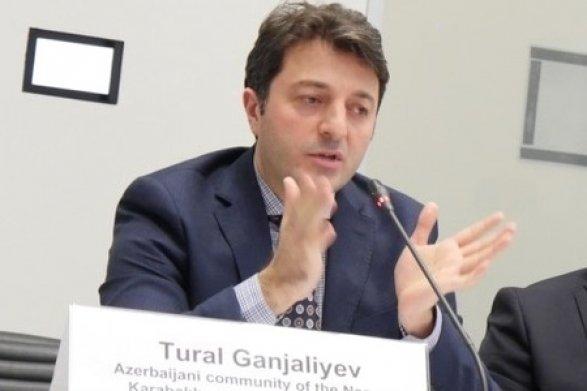BAKU, Azerbaijan, Nov. 26
By Samir Ali - Trend:
Chairman of the Azerbaijani community of the Nagorno-Karabakh region Tural Ganjaliyev has made a statement, Trend reports.
"As known, a group of journalists from Azerbaijan and Armenia, including from the Armenian community of the Nagorno-Karabakh region of Azerbaijan, has recently made mutual visits. The visits were organized by the personal representative of the OSCE Chairman-in-Office Andrzej Kasprzyk and his representatives in Baku, Yerevan and Khankendi," the statement reads.
"During the visit, Armenian journalists met with their Azerbaijani colleagues, representatives of civil society and research centers, visited Russian Orthodox, Catholic churches, Jewish synagogues peacefully functioning in the country, as well as the ASAN service, the DOST center, Ganja and Guba cities. Also, Armenian journalists were familiarized with the Armenian church in downtown Baku, which stores books in Armenian. The Azerbaijani community of Nagorno-Karabakh also participated in the meetings with Armenian journalists."
The statement notes that Armenian journalists got acquainted with the development of Azerbaijan, the multicultural environment in the country, became eyewitnesses of peace and stability, the state's concern for citizens and the prosperity of the regions.
"Azerbaijani journalists on OSCE vehicles visited Armenia, the occupied Shusha and Khankendi towns, met and held discussions with the Armenian community of Nagorno-Karabakh. The visit of Armenian journalists, including a journalist from the Armenian community of the Nagorno-Karabakh region of Azerbaijan to Baku, Ganja and Guba, the visit of Azerbaijani journalists to Shusha and Khankendi and meetings with the local Armenian community contribute to the dialogue between the Armenian and Azerbaijani communities of Nagorno-Karabakh region of Azerbaijan," the statement reads.
"We have always supported and encouraged dialogue, peaceful coexistence of the Azerbaijani and Armenian communities of the Nagorno-Karabakh region of Azerbaijan, and we consider the carried out visits and meetings in this context," Ganjaliyev concluded.
The conflict between the two South Caucasus countries began in 1988 when Armenia made territorial claims against Azerbaijan. As a result of the ensuing war, Armenian armed forces occupied 20 percent of Azerbaijan, including the Nagorno-Karabakh region and seven surrounding districts.
The 1994 ceasefire agreement was followed by peace negotiations. Armenia has not yet implemented four UN Security Council resolutions on withdrawal of its armed forces from Nagorno Karabakh and the surrounding districts.






